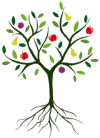Ellison's Orange
Ellison's Orange is a superb traditional English dessert apple, closely related to Cox's Orange Pippin, but with a notably juicier flesh. It has the attractive orange flush so typical of English apples.
Ellison's Orange is known for its background aniseed note which enhances the aromatic complexity so typical of a Cox-style apple. In a good year the flavour of Ellison's Orange makes it one of a very small number of varieties which could truely be put on a par with Cox's Orange Pippin.
Ellison's Orange apple trees for sale
RF11-year bare-root
tree
on MM106 rootstock£34.95
Mature height: 3m-5m after 10 years
Can be trained on as a large free-standing apple tree, a half-standard apple tree, a large apple fan or espalier, or a pleached apple tree. Available next season
RF22-year bare-root
tree
on MM106 rootstock£43.00
Mature height: 3m-5m after 10 years
Suitable for a large bush-trained free-standing apple tree. Available next season
RF32-year half-standard bare-root
tree
on MM106 rootstock£46.50
Mature height: 3m-5m after 10 years
Suitable for a free-standing half-standard apple tree. Available next season
Growing and Training
Ellison's Orange is a mid-season variety, and generally easy and reliable to grow. It makes a good alternative to the more temperamental Cox's Orange Pippin, and has better disease resistance.
Recommended pollinators for Ellison's Orange apple trees
Ellison's Orange is partially self-fertile, so you do not need another variety to pollinate it to produce fruit.
However you will get a better crop if you plant any of the following pollinator varieties nearby.
If you are not sure about pollination requirements don't hesitate to ask us.
BraeburnBraeburn is one of the best-flavoured supermarket apple varieties.
GalaGala is popular supermarket apple - but better when home-grown, with a sweet pleasant flavour.
Newton WonderA traditional English cooking apple, a good alternative to Bramley.
King of the PippinsA popular and versatile dual-purpose apple, widely grown in the Victorian era.
John DownieJohn Downie is a traditional crab apple for making crab apple jelly. White blossom and orange-red fruits.
Peasgood's NonsuchPeasgood Nonsuch is a highly-regarded old-fashioned English cooking apple.
Golden HornetMalus Golden Hornet is a traditional white blossom crab apple, with persistent yellow fruits.
Golden GemA traditional crab-apple featuring a mass of white blossom in spring, followed by yellow crab apples.
History
Raised by the Reverend Ellison in Lincolnshire, England, c1905. Believed to be a cross between Cox's Orange Pippin and an old French apple variety.
Ellison's Orange characteristics
- Gardening skillAverage
- Fruit persistenceNormal ripening
- Self-fertile?Partially self-fertile
- Pollinating othersAverage
- Pick seasonMid
- Picking periodmid-September
- Keeping1 week
- Food usesEating fresh
- Country of originUnited Kingdom
- Period of origin1850 - 1899
- Fruit colourOrange flush
You might also like these varieties
Christmas PippinChristmas Pippin is a new high-yielding Cox-style apple, discovered as a chance seedling tree.
FiestaFiesta (or Red Pippin) is one of the best Cox-style apples, easy to grow, with a good aromatic flavour.
Kidd's Orange RedKidd's Orange Red is one of the best Cox-style apples, aromatic, sweet, and easy to grow.
Red FalstaffRed Falstaff is one of the best garden apple trees, heavy crops, easy to grow, and very juicy.
More about apple trees
Apples are very versatile, and all varieties can be eaten or used in the kitchen. However varieties specifically grown as eating apples tend to have the best flavours for eating raw.
The main thing to decide when choosing an eating apple is when you intend to eat the apples. Early season apples are typically ready in August, and generally don't keep very long. Mid-season apples are ripe in early September, while late-season apples start to become ripe in late September and October. Many of the late-season varieties can also be stored in a fridge or cold shed for several months into the winter.
Some apple varieties are self-fertile, but most are not. However in most areas of the UK you do not need to worry whether your apple trees are self-fertile or not, as there will be other apple trees in nearby gardens to help with pollination.
